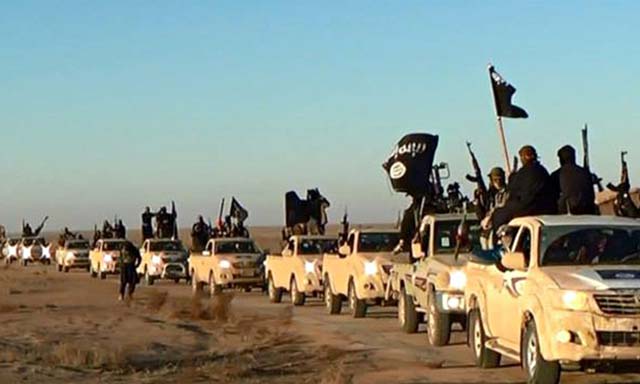The self-proclaimed Islamic State burst on to the international scene in 2014 when it seized large swathes of territory in Syria and Iraq. It has become notorious for its brutality, including mass killings, abductions and beheadings. The group though has attracted support elsewhere in the Muslim world – and a US-led coalition has vowed to destroy it.
In June 2014, the group formally declared the establishment of a “caliphate” – a state governed in accordance with Islamic law, or Sharia, by caliph.
It has demanded that Muslims across the world swear allegiance to its leader – Ibrahim Awad Ibrahim al-Badri al-Samarrai, better known as Abu Bakr al-Baghdadi – and migrate to territory under its control. IS has also told other jihadist groups worldwide that they must accept its supreme authority.
“IS can trace its roots back to the late Abu Musab al-Zarqawi, a Jordanian who set up Tawhid wa al-Jihad in 2002. A year after the US-led invasion of Iraq, Zarqawi pledged allegiance to Osama Bin Laden and formed al-Qaeda in Iraq (AQI), which became a major force in the insurgency.”
Baghdadi, a former US detainee, became leader in 2010 and began rebuilding ISI’s capabilities. By 2013, it was once again carrying out dozens of attacks a month in Iraq. It had also joined the rebellion against President Bashar al-Assad in Syria, setting up the al-Nusra Front.
In April 2013, Baghdadi announced the merger of his forces in Iraq and Syria and the creation of the Islamic State in Iraq and the Levant (ISIS). The leaders of al-Nusra and al-Qaeda rejected the move, but fighters loyal to Baghdadi split from al-Nusra and helped ISIS remain in Syria.
In June 2014, ISIS overran the northern city of Mosul, and then advanced southwards towards Baghdad, massacring its adversaries and threatening to eradicate the country’s many ethnic and religious minorities. At the end of the month, after consolidating its hold over dozens of cities and towns, ISIS declared the creation of a caliphate and changed its name to Islamic State.
The militant group is believed to be the world’s wealthiest. It initially relied on wealthy private donors and Islamic charities in the Middle East keen to oust Syria’s President Assad. Although such funding is still being used to finance the travel of foreign fighters to Syria and Iraq, the group is now largely self-funding.
“The US Treasury estimates that in 2014, IS may have earned as much as several million dollars per week, or $100m in total, from the sale of crude oil and refined products to local middlemen, who in turn smuggled them in Turkey and Iran, or sold them to the Syrian government.”
Currently, the ISIS molests a large number of women who belong to religious minority group. As the militant group took over large portions of Syria and Iraq last summer, enslaved numerous religious minority women and killed religious minority men. It has been widely reported that many ISIS female captives commit suicide out of fear of being raped or in the aftermath of rape and abuse.
Religious minority women, some being as young as 8 years old, are passed around, sold, beaten, tortured and shared sexually by multiple ISIS fighters, who claim that it is their Allah-given right to hold infidel women as sex slaves and property. Many ISIS female captives are afraid that even if they are able to escape and reunite with their families, their families will not accept them.
A report released by the Human Rights Watch, which features interviews with women who were sexually enslaved by ISIS and were fortunate enough to escape, states that ISIS militants sometimes hold lottery drawings to determine which girls the fighters will be able to take home as property. Additionally, the report found that ISIS militants beat, torture, underfeed and electrocute enslaved religious minority women.
“Later that day they [ISIS fighters] made a lottery of our names and started to choose women by drawing out the names. The man who selected me, Abu Ghufran, forced me to bathe, but while I was in the bathroom I tried to kill myself,” 31-year-old Rashida is cited as saying. “I had found some poison in the house, and took it with me to the bathroom. I knew it was toxic because of its smell. I distributed it to the rest of the girls and we each mixed some with water in the bathroom and drank it. None of us died but we all got sick, some collapsed.”
ISIS has changed into global threat and it is under the world negotiation. Similarly, it seeks foothold in Afghanistan intending to spearhead war across the country. There are reports that IS holds sway in about 25 provinces. No doubt, IS decides to extend its sphere of power in war-torn countries so as to fish in troubled water. Therefore, Afghanistan is one of the targets. It is believed that the mysterious abductions, which are taking place in recent months and deemed a new phenomenon in the country, are carried out by the militants operating under the black flag of IS and aim to spark discriminations on the basis of race, religion, creed, etc. among the nation. So, there is a strong potential for triggering sectarianism in Afghanistan.
The world will have to eradicate ISIS in Iraq and Syria and let not it extend its realm of power in other countries and blackmail the world. In nutshell, the radicalization and toxin it spews forth should be rooted out as soon as possible so as not to poison larger number of people.

